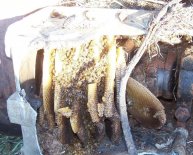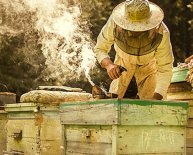
How to start a Beehive at home?
 Dear Modern Farmer,
Dear Modern Farmer,
We live-in a fairly thick metropolitan area, in which I keep a small rooftop garden. I’ve decided i wish to branch on and begin a beehive. Is it appropriate? Do I need to register my beehive someplace? Just what do i must inform my next-door neighbors? If, when you look at the not likely chance, someone gets stung am We legally liable?
Thanks A Lot,
Aspiring Apiarist
Dear Aspiring Apiarist,
You are asking all correct questions within right time — which, just before bring your first bees house. The reason being the solution to your concerns is, “it depends”, and never understanding the rules and best beekeeping methods in advance might get you into trouble. Luckily, beekeeping on residential property is permissible in a lot of places, though usually in the confines of specific requirements.
To find out whether bees tend to be permissible where you live, you need to check out the regional zoning ordinance. The zoning signal will specify whether bees are allowed within zoning area — either “as of right” (without a permit) or with a special license — or prohibited entirely. Regrettably, some zoning ordinances are vague and poorly written nor expressly condition whether bees are allowed or perhaps not. Within these cases you'll desire to talk to your local zoning administration officer or building department (or an attorney) getting further assistance. Also, some communities address the permissibility of bees via their particular local wellness signal and/or animal control ordinances, therefore always check those also. In the event your residential property is a component of a condominium or home owners’ connection, additionally should confirm whether beekeeping is allowed under those rules and bylaws. Even if the neighborhood zoning code allows bees, in case your property owners’ association bylaws prohibit bees, you're going to be off chance unless you could possibly get a waiver or change the bylaws.
Presuming bees are permitted inside zoning district and regulated through the zoning ordinance, you must know what demands needs to be met to enable one to conform to regulations. Many zoning ordinances will control some or all after:
• minimal lot size needed for maintaining bees;
• siting of hives and minimal setbacks to residential property lines and adjacent frameworks;
• permissible kinds of hives and bee types (for example. mild stock or no Africanized bees);
• optimum few hives/swarms;
• whether enclosures, fencing or hedges (flyaway barriers) are expected; and
• requirements for on-site water resources (to minimize drift onto adjacent properties with standing liquid resources want swimming pools).
Regardless of if the zoning regulation cannot address all of these elements, you should always fill out the spaces through the use of most readily useful beekeeping practices set up for the area. This guarantees a healthy and balanced hive and increases a peaceful coexistence with people in close proximity. Your local farming expansion company or pastime beekeeping organizations provides information in this regard.
The leniency of beekeeping ordinances differs commonly among communities. Like, in Cleveland, the amount of hives permitted in domestic districts is limited by great deal size, with one (1) hive permitted for almost any 2, 400 square feet of great deal location (no hives are permitted on lots significantly less than 2, 400 square feet). The hives needs to be set back at least 5 foot from any home line, at the very least 10 feet from any home on adjacent lots. Beekeepers in Cleveland must get a 2-year license, which costs $50 and needs to be renewed when it expires. Into the residential zoning districts of Madison, Wisconsin, as much as six (6) hives tend to be permitted per good deal, but no minimum great deal dimensions are specified (though there are minimum setback needs: 10 feet from community sidewalks, three feet from home outlines and 25 feet from abutting main structures, like a neighbor’s residence). Licensing fees in Madison (including the preliminary application) expense just ten dollars yearly, and licenses is revoked if you will find three beekeeping regulation violations within a 6-month duration. Things tend to be bit more costly and thorough for beekeepers in Minneapolis, which calls for a short permit charge of $100 (thankfully, in April 2013, the Minneapolis City Council amended the ordinance to eradicate the $50 yearly revival charge that was when needed). Minneapolis beekeepers should receive the written consent of 80 % of next-door neighbors within 100 feet associated with the residential property and 100per cent regarding the immediate abutters (except for roof hives sited two stories or higher), and complete and offer evidence of attendance at among three skilled beekeeping classes.
See also:
- https://at.ketoxp-gummies.com KETOXP Lieferung: keto try this KETOXP.

















